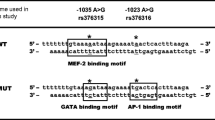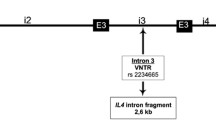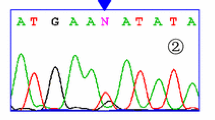Abstract
Interleukin 16 (IL-16) is a chemotactic cytokine which binds to CD4 and affects T cell activation. Here we report a novel single nucleotide polymorphism, T to C, in the promoter region of the IL-16 gene in two distinct Asian populations, Japanese and Thai. This mutation occurs at an allele frequency of approximately 22% and 18%, respectively. Although IL-16 potently suppresses replication of human immunodeficiency virus type 1 (HIV-1), we observed no significant difference in the allele frequency of this polymorphism between HIV-1-infected and non-HIV-1-infected individuals in both Asian populations. Since differential IL-16 levels have been reported to be associated with inflammatory diseases such as systemic lupus erythematosus, atopic dermatitis and allergic asthma, it would be of interest to analyze the allele frequency of this mutation in patients with these autoimmune and allergic diseases.
Similar content being viewed by others
Author information
Authors and Affiliations
Corresponding author
Additional information
This work was supported by grants from the Ministry of Education, Science, Sports and Culture, the Ministry of Health and Welfare, and the Organization for Pharmaceutical Safety and Research (OPSR), Japan.
Rights and permissions
About this article
Cite this article
Nakayama, E., Wasi, C., Ajisawa, A. et al. A new polymorphism in the promoter region of the human interleukin-16 (IL-16) gene. Genes Immun 1, 293–294 (2000). https://doi.org/10.1038/sj.gene.6363672
Received:
Accepted:
Published:
Issue Date:
DOI: https://doi.org/10.1038/sj.gene.6363672
- Springer Nature Limited
Keywords
This article is cited by
-
Serum concentrations of IL-16 and its genetic polymorphism rs4778889 affect the susceptibility and severity of endometriosis in Nigerian women
BMC Women's Health (2023)
-
Genetic polymorphisms of interleukin-16 in Egyptian patients with primary knee osteoarthritis
Egyptian Rheumatology and Rehabilitation (2023)
-
Interleukin-16 genetic polymorphisms in Guangxi Chinese with hepatitis B virus-related liver cirrhosis
Molecular Biology Reports (2023)
-
Association of interleukin 16 gene polymorphisms and plasma IL16 level with osteosarcoma risk
Scientific Reports (2016)
-
−295 T-to-C promoter region IL-16 gene polymorphism is associated with Whipple’s disease
European Journal of Clinical Microbiology & Infectious Diseases (2015)




